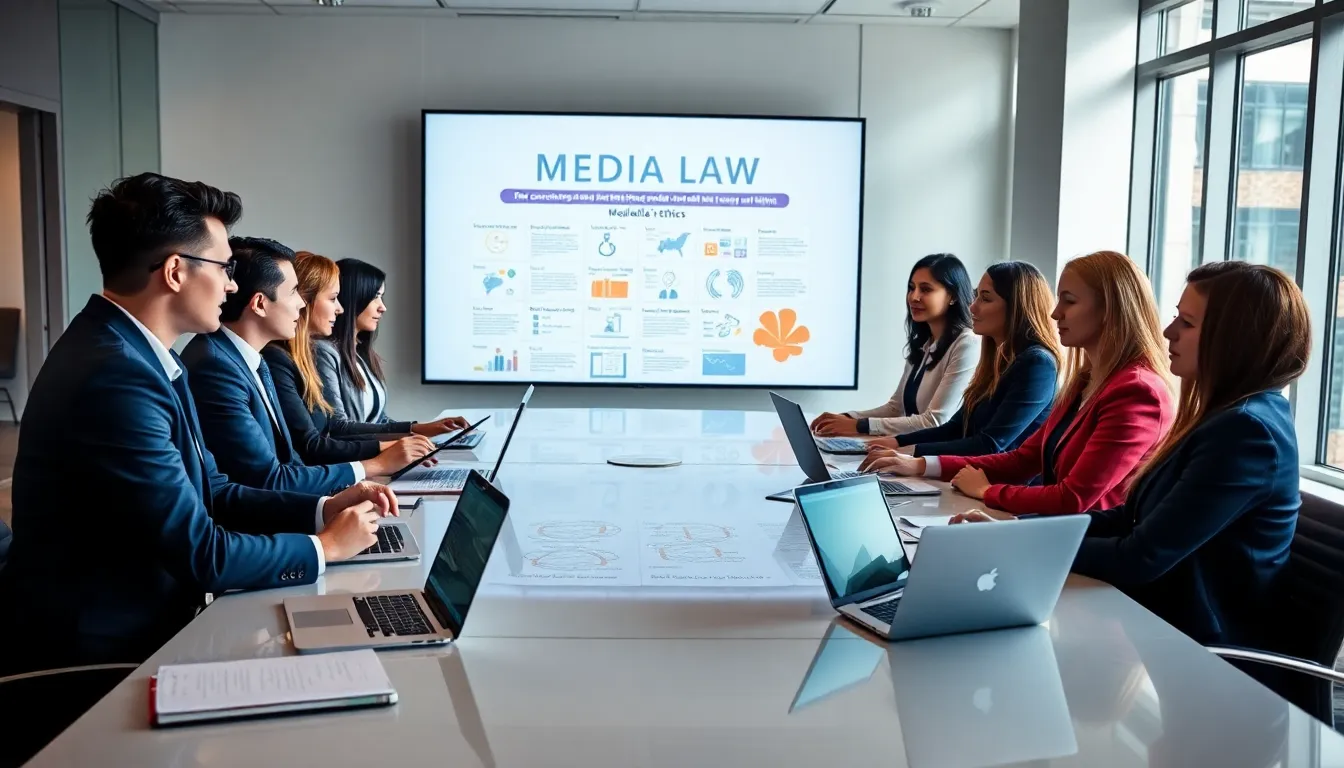Table of Contents
ToggleIn an age where anyone can be a journalist with just a smartphone and an internet connection, understanding media law and ethics becomes essential. It’s like knowing the rules of a game while you’re out there playing, nobody wants to be that player who doesn’t know they can’t pass the ball after three steps. So, whether you’re an aspiring journalist or a seasoned media professional, diving deep into this topic can keep you out of hot water, and maybe even make you chuckle along the way. Let’s break down the legal jargon, explore ethical dilemmas, and provide you with the right resources to navigate this essential field. Spoiler alert: there’s a lot more than just reading statutes and regulations.
Understanding Media Law

Understanding media law is crucial for anyone working in or consuming media today. At its core, media law encompasses the legal principles that govern the gathering, production, and dissemination of information. From broadcasting to digital journalism, these laws are designed to protect the rights of individuals and organizations while ensuring freedom of expression.
One significant area is copyright law, which prevents unauthorized use of someone else’s content. Fair use can sometimes allow for exceptions, but navigating these waters requires a keen understanding. Defamation is another critical aspect. Speaking ill of someone, whether in a tweet or a news article, can lead to serious legal consequences. Hence, media professionals must be savvy about how they phrase their content.
Also, privacy rights have become increasingly relevant in the digital age. With vast amounts of personal information available online, knowing how to respect privacy while providing news is a tightrope many journalists walk every day.
The Importance Of Media Ethics
Media ethics involves the principles and standards that guide media professionals in their work. While law outlines what is permissible, ethics often dictates what is right. The public relies on media not just for information but for trustworthiness and integrity.
Ethical lapses can result in not only legal troubles but a complete breakdown of trust between the media and the audience. For instance, sensationalism or misinformation can lead to public panic or misplaced outrage. In an environment overflowing with information, distinguishing credible sources from dubious ones is paramount. Ethical considerations ensure that media practitioners prioritize accuracy, fairness, and accountability.
Key Areas Of Media Law
Several key areas of media law impact how content is created and shared:
- Freedom of Speech and Expression: This fundamental right is the backbone of many democracies, allowing for open dialogue and dissent.
- Copyright and Intellectual Property Rights: These laws protect creators’ work, but also challenge journalists to create original content without infringement.
- Libel and Slander: Both forms of defamation can result in lawsuits if someone conveys false statements damaging to another’s reputation.
- Privacy Laws: As media can easily infringe on personal privacy, journalists must tread lightly, especially about public figures and private citizens.
Navigating these areas requires continuous education and awareness, as laws can evolve.
Ethical Principles In Media Practice
When it comes to ethical media practice, several principles are widely acknowledged. These include:
- Truthfulness: Media professionals are expected to report facts accurately without distortion.
- Fairness: Giving all sides of a story a voice fosters balanced reporting.
- Independence: Keeping journalists free from outside influence ensures their work remains unbiased.
- Accountability: Owning up to mistakes and correcting them fosters credibility.
So, these principles act as the guiding light for media practitioners, often leading them in difficult decisions.
Resources For Learning Media Law And Ethics Online
Navigating Legal Challenges In Media
Learning about legal challenges in media can help professionals prepare for potential pitfalls. Websites such as the Reporters Committee for Freedom of the Press provide extensive resources.
Case Studies In Media Law
Case studies often illustrate how the law intersects with real-life scenarios. Examples like New York Times Co. v. Sullivan showcase landmark decisions that shape modern media law.
Online Courses And Certifications
Platforms like Coursera and edX offer courses specific to media law and ethics. These can range from introductory to advanced levels, allowing practitioners to choose based on their expertise.
Websites And Articles For Further Reading
Numerous articles and blog posts detail current trends and challenges in media law. Resources like the Poynter Institute frequently publish relevant content to keep media professionals informed.




